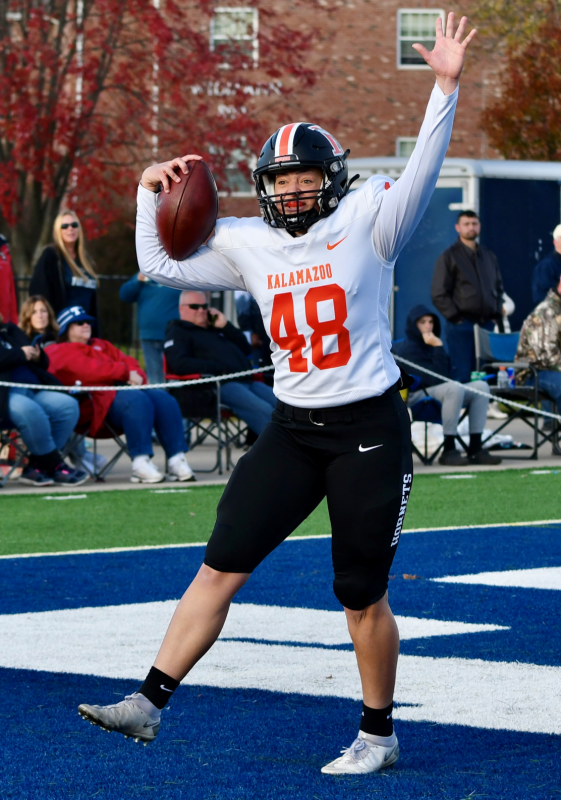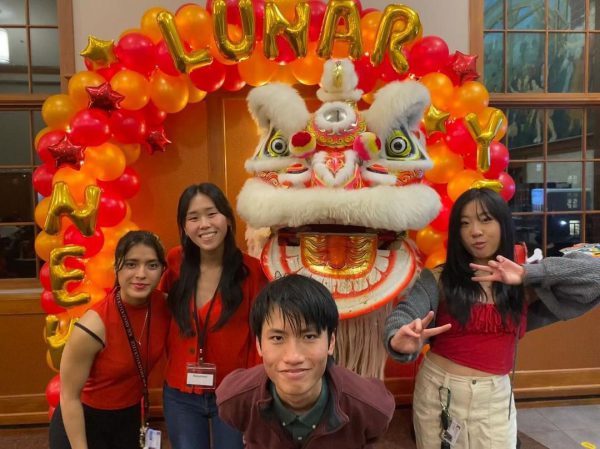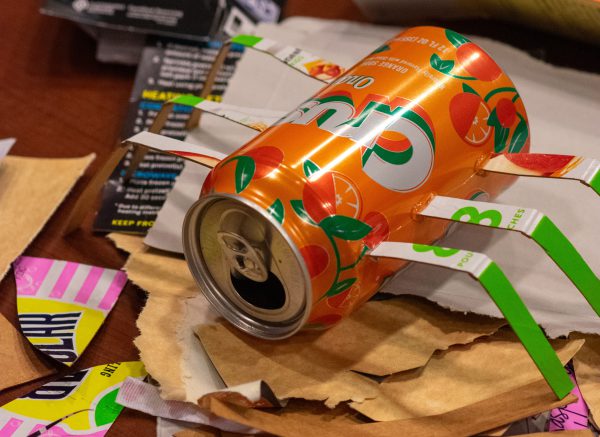The Model United Nations team from Kalamazoo College earned an Honorable Mention Delegation award at the National Model United Nations (NMUN) in New York in April, and several awards at the Midwest Model UN (MMUN) conference in St. Louis, Missouri, in February.
The NMUN honor places the 15 K students who participated—half of whom were rookies—in the top 20% of the largest, most established intercollegiate Model UN conference in the world.
“I was very proud of that, especially with a good half of our students coming into New York completely new to conferences,” said Mason Purdy ’24, president of Model UN at K. “We did as much teaching and training as we could, but they had to learn as they went.”
The K team represented the Kingdom of Morocco at NMUN, with students assigned in pairs to various committees. For example, Purdy and Hannah Willit ’24, vice president of Model UN at K, served on the human rights council. Each council considers two topics. For Purdy and Willit, the topics were human rights and the use of private military and security companies as well as human rights of indigenous peoples. Before the conference, teams research existing laws and standards, their country’s history, and other areas that provide context for the topics.
“For example, Morocco has been embroiled in a controversy for years about territory in the Western Sahara,” Purdy said. “One side says this was always Moroccan land and was taken for colonization; the other side says the people who live there don’t really want to be Moroccan; the first side says they are Moroccan, they just don’t realize it. The issue of indigenous sovereignty is a politically tricky one for Morocco, and sometimes you have to represent views at Model UN that maybe you wouldn’t love as an individual.”




Maddie Hanulcik ’26 served on the commission on the status of women, which considered the empowerment of rural women and girls along with healthcare accessibility for women.
“It was largely an all-women committee, which made it a safe space for women to talk,” Hanulcik said. “We were all dedicated to the same ideas of furthering women’s rights. All of our committee papers passed. I had never been to a conference where every paper passed. It was cool to see us all working together and how everyone felt empowered to share and speak without fear.”
At each Model UN conference, committees employ both formal (speeches) and informal (networking and developing de facto working groups) sessions to work toward a resolution addressing each topic. Over hours and days, a few resolutions will emerge that the dais (a moderating team of staff members) evaluates as acceptable, the committee will vote, and amendments will be made. The goal is that the committee will eventually adopt one resolution unanimously.
“Generally, the aim on a Model UN committee is to try to get as much unanimity in agreement as you can on an issue, because in the real international community, that’s how you get change to actually happen,” Purdy said. “Model UN tries to replicate that, and in the process, it teaches conflict resolution, negotiating, compromise, and social and political skills.”
A highlight of the New York conference for Hanulcik came when the resolution she had primarily worked on was one of just a couple chosen to be sent to the actual United Nations.
“It felt incredible that so many people from so many places had come together, even though we had very different backgrounds, to find resolution on this issue and make such a powerful, moving paper that our dais submitted it to the actual United Nations,” Hanulcik said. “It was wonderful to feel like we have power in the future as the next generation.”
For Hanulcik, a political science major with concentrations in community and global health and in women, gender and sexuality, Model UN offers the feel of real-world experience and develops public speaking abilities, teamwork and collaboration, friendships and optimism.
“Even though it’s not the real world—it’s a model—it gives the sense of what you can do outside of school with the classes you’re taking and see how they can be applied,” Hanulcik said. “For example, in my women, gender and sexuality classes, we learn theories about how women can be fully liberated. Then I go to Model UN and see how those policies can be put in place to make a difference in women’s lives. There is such optimism, and that goes for the real UN as well. It’s easy to know that our world is a hard place to live in and can be terrible for so many people. But the UN has this optimism about it. We’re going to keep trying. We’re going to pass these resolutions. We’re going to encourage people to implement them. It’s a place to gather and try to make things a little bit better with the power of collaboration.”
Prior to New York, a smaller group of K students attended the Midwest Model United Nations conference, where the team received several awards. There, the more experienced students represented Azerbaijan while the newer participants represented Lebanon.
“During the St. Louis conference, there was a big plenary where everyone comes together in one room and votes up or down the resolutions that each committee has done,” Purdy said. “There’s debates and amendments, so on and so forth. Representing Azerbaijan, I went to our delegates representing Lebanon—our learners—with a resolution. I said, ‘We would really like your support for this; we would like you to sign on to it.’ They read through it, and they were like, ‘No. Lebanon cannot support this.’ And I was so glad that they didn’t just say yes to me because I was their friend and their teacher. I was like, ‘Yes, you guys are getting it.’ That might have made me more proud than some of the awards we won.”
Those awards included Distinguished Delegation as Azerbaijan, placing the team in the top 10 of all countries represented. Team members also won three individual awards, with Nathan Bouvard winning an award for his position paper in General Assembly 2 as Azerbaijan, Martina Marín winning a position paper award in the World Health Organization as Azerbaijan, and Purdy winning the top honors of Outstanding Delegation as Azerbaijan in the UN Environmental Assembly.
A double major in religion and political science with a Jewish studies concentration, Purdy is grateful that the Office of Student Activities and the Department of Political Science fund Model UN at K.
“Model UN has made a world of difference to me, developing my skills, developing as a person, developing as a leader, being in charge of this club,” Purdy said. “I’m a first-generation student, I come from a very working-class background; If I’d had to pay to participate, I would have had to say no. I’m so glad the K Model UN program is free to students. And we get to do that because the school is very generous, and its donors are very generous. I’m very proud that our program is free because in some places, this is an elite activity. It’s cordoned off for people with wealth, with financial privilege, and I’m glad that’s not the case at this school. Here, Model UN is about your willingness, your talent, your commitment, and that makes a world of difference with our team.
“I’m happy to say Model UN has made the recovery post-COVID, and we are larger and more competitive than I ever saw us. I’m very proud of this program and I hope that the people I hand it off to will bring it to new heights.”


Midwest Model United Nations Participants
- Nathan Bouvard
- Laura Goia
- Martina Marin
- Nailia Narynbek Kyzy
- John O’Neill
- Mason Purdy
- Hannah Willit
- Wendy Yan (Yan Yazhuo)
National Model UN Participants
- Belen Cañizares Acuña
- Nathan Bouvard
- Maansi Deswal
- Laura Goia
- Kenia Gonzalez
- Teresa Gonzalez Redondo
- Paola Guzman Jimenez
- Maddie Hanulcik
- Rob Kloosterman
- Nailia Narynbek Kyzy
- Andrea Ladera
- Martina Marin
- John O’Neill
- Mason Purdy
- Hannah Willit


































